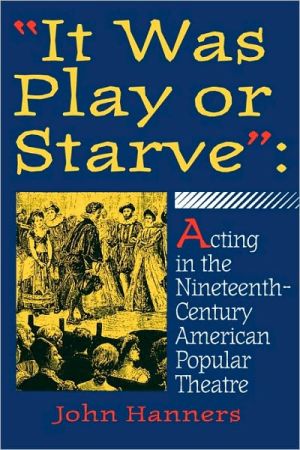

 |

|

The average rating for It Was Play Or Starve based on 2 reviews is 4 stars.
Review # 1 was written on 2014-06-29 00:00:00 Jason Skipchak Jason SkipchakA few passages from Stage Fright, Animals, and Other Theatrical Problems: The experience of this theatre-goer, then, is one in which anticipation gives way to disappointment, in which pleasure is bound up with anxiety and even perhaps pain and illness, in which acting is confused with vulgar interruption, in which the transcendent possibilities of the world's greatest dramatic poetry appear to pass by almost unnoticed in a 'deliberate monotone', and success appears as dependent upon the audience as it is upon the artistic capability of the actor. Yet for all this, for all the confusion, anxiety and disappointment, it is an experience which he cannot bear to bring to an end, and to which he will repeatedly seek to return. This ambivalence certainly characterizes my own relationship with the theatre. Theatre, being queasy, makes me queasy. That such queasiness is widespread, that we find theatre uncomfortable, compromised, boring, conventional, bourgeois, overpriced and unsatisfactory most of the time, is I think not only generally accepted as true, but also generally accepted as part and parcel of the whole business. Theatre's failure, when theatre fails, is not anomalous, but somehow, perhaps constitutive. What I want to argue here is that it is precisely in theatre's failure, our discomfort with it, its embeddedness in capitalist leisure, its status as a bourgeois pastime that its political value is to be found. Theatre is a privileged place for the actual experience of a failure to evade or transcend capital. Of course, never in the history of theatre has the social position of the actor been so similar to the social situation of the character: they are, at last, contemporaries, and more than that, members of the same social class. This means that the 'actual life' the actor is required to simulate is close enough to her own for her life to become a private resource for public display. While Diderot feared that the actor's over-identification with the emotions of the character would be detrimental to theatrical representation because it would lead the actor to lose control of her technique, the new danger for the actor is that their new technique, along with the new forms and subject matter of bourgeois naturalist drama, might permit so intense an over-identification, that the actor might no longer be required to act at all, but instead just effectively 'be' a version of herself. McKinnie points out that the theatre is an economic subsector in which work is clearly alienated. Picking up on this perception one notes how the employee's time is regulated with rigorous force by bells and curtains, how both the rehearsal process and the nightly routine of performances are dominated by repetitive activity, how wage levels are set in structures of extreme differentiation, how these are maintained by a huge pool of surplus labour which renders effective industrial organization impossible, and how the core activity itself is both a metaphor of alienation and alienation itself: the actor is paid to appear in public speaking words written by someone else and executing physical movement which has at the very least usually been subjected to intense and critical scrutiny by a representative of the management who effectively enjoys the power of hiring and firing. The actor is both sign and referent of the wholly alienated wage slave. |
Review # 2 was written on 2015-09-15 00:00:00 Mike Mutisya Mike MutisyaTime to be a geek! Here with another entry of an academic book with a somewhat phenomenological perspective of theatre. Don't be scared by the big word. In fact, Ridout does a great job in creating a book that addresses complex theatrical issues without making it incomprehensible. Although Ridout claims not to be phenomenological, his way of speaking about the experience of the actor, and his very Heideggerian mention of issues of the 'theatricality of theatre', make it complicated for him not to be. I mean, the book uses resources like the fear of the actors, their sensation of appearing when they are being looked at by the audience, to make obvious and explore in depth the illusion and fiction of theatre... which at the same time, being the things that make it what it is, are the basis of the authenticity of theatre. It talks about things like how the use of animals on stage creates awareness in the spectator of the 'reality' in the fiction that they are seeing (after all, no one can really make animals act); or how the gaze of the spectator makes the actors aware of their own presence - with emphasis on the "present" part of the word; or how when we try to copy (mimesis) something, we are creating a new version of that which we are copying, which means that, in the end, we are not really copying anything but really being there making a new version of it. I swear he explains it way better than I do, so if you are confused well... luckily there is a book you can read. I confess that a lot of my appreciation for the book comes from its constant reference to Kleist's essay on puppets. And well, ok, I perfectly understand that it is not everyone's taste. You have to be quite geeky about theatre, but I think even you are a geeky spectator, it might be interesting and provide new perspectives. |
CAN'T FIND WHAT YOU'RE LOOKING FOR? CLICK HERE!!!